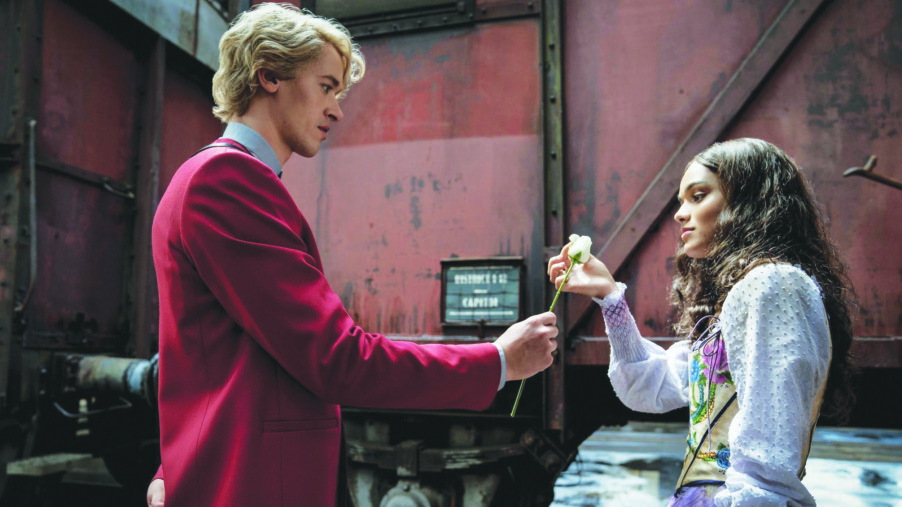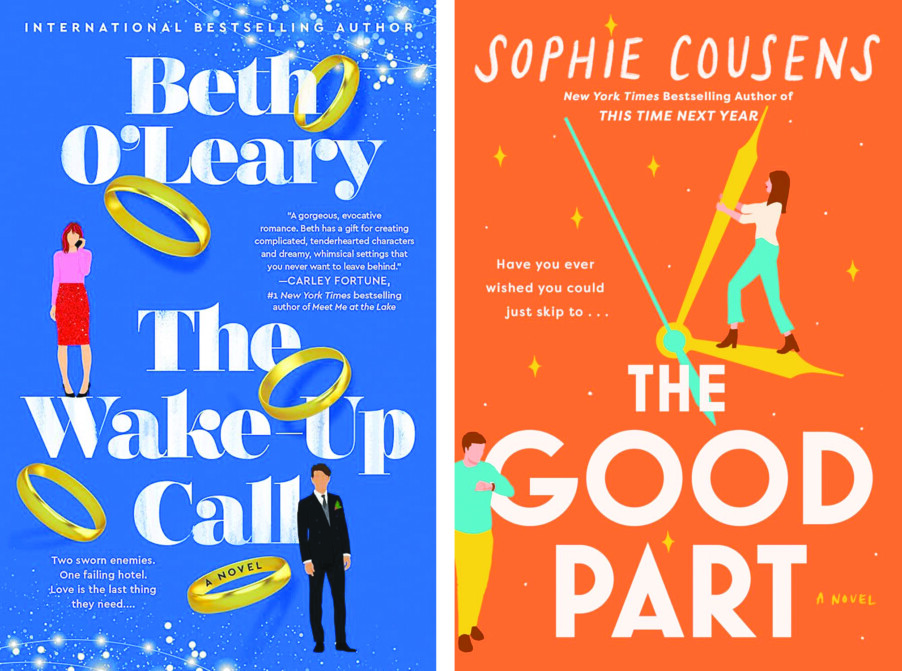Coriolanis Snow grows from an ambitious teenager into the guy who will one day be Donald Sutherland in The Hunger Games: The Ballad of Songbirds and Snakes, a prequel to the Katniss-era Hunger Gameses based on the book by the same name.
In the movie’s main timeline, Coriolanis (Tom Blyth) is a high school senior or something who is trying to win a big scholarship that will not only cover his university tuition but also get money to his family. The Snows were once a big noise in the Capitol, the ruling city of Panem, the dystopia where all this business is set. But then there was a rebellion and both of Coriolanis’ parents died and now they are sort of shabby gentry with Coriolanis and his big-sister-like cousin Tigris (Hunter Schafter) living with their grandmother (Fionnula Flanagan) in an apartment they can’t quite afford. On the day when Coriolanis expects his winning of the Plinth Prize to be announced, the school’s head Casca Highbottom (Peter Dinklage, who seems like he’s really trying) tells the top students that they have one more task before anyone’s getting any scratch. They will all become mentors for competitors in the upcoming Hunger Games, a death match ritual featuring children from the 12 Districts the Capitol rules.
The Hunger Games, now in their 10th year, are not the hot-ticket reality show Super Bowl-like blowout they are in the later movies. Their ratings have declined so much the ruling government seems on the fence about whether they should still have them. Dr. Volumnia Gaul (Viola Davis), a games designer and bio-weapons designer and general nutcase, is really insistent that they continue and I think hopes the mentors will jazz them up a little. Though why exactly is unclear. As viewed in this movie (and actually, in the whole series), the Hunger Games seem like a waste of time (and an easy target for dissenters) for this authoritarian regime that seems to be having enough trouble just keeping itself out of civil war.
Anyway, victory by the competitors in the games will mean victory for the students competing for the Plinth Prize. And “victory” doesn’t necessarily mean being the last gamer standing. It can also mean having a competitor with a compelling story who gets people to tune in. Lucky for Coriolanis, his mentee is Lucy Gray Baird (Rachel Zegler, having fun with what she’s given). When Lucy Gray’s name is called during the reaping, she responds with a knowing smile. As she walks to the podium, surrounded by whispers, in a fancy Belle Epoque-y dancing girl dress, she stops to put a snake down a girl’s back and then she sings a defiant little song into the mic. A member of a tribe of traveling musicians, she’s known for twangy folk tunes and boyfriend seducin’. So much more personable than the girl with tuberculosis!
Snow quickly figures out how to play the publicity game element of the Hunger Games, helping to develop some of the elements — donate to your favorite player! — that will become an important part of the Games in the later years. Also giving hints to what the Games will become is a theatrical weatherman named Lucky Flickerman (Jason Schwartzman) who is trying to make this show all it can be.
Dinklage might be the guy doing more Serious Acting than this movie warrants, but Schwartzman seems to be the guy really finding a tone and leaning all the way in with it. His Lucky doesn’t exactly fit with the vibe of the rest of the movie, but he’s definitely the film’s most entertaining element.
This movie falls somewhere between “the dark education of a could-go-either-way Coriolanis Snow” and “a guy who starts off as an ambitious opportunist remains ambitious, sees opportunities.” As the Games progress, Coriolanis’ desire to have Lucy Gray be successful for his own goals turns into actual desire for Lucy Gray. They are, for a while, in love. Or either one or both of them is playing a long con to use the other for their advancement in this morally bankrupt society. Or life is complicated and both things are true. Intellectually, I like that the movie lets you read the story it’s telling in a few different ways. In fact, the more I thought about the way this movie’s character motivations were constructed, the more interesting I found it.
After the fact.
In the moment, sitting in the theater, this made for some very slow, boring storytelling. I know who Snow is going to become and this movie doesn’t really give me a reason to care how he got that way. And I feel like I’m watching the teen soap operaversion of Hunger Games dystopia — it’s all smaller, snottier and more high school. The big scary Panem Capitol and its rulers don’t even seem quite as all-powerful and authoritarian here as in the original movies — they are basically every familiar aristocracy of rich jerks you’ve ever seen anywhere, from Gossip Girl to, like, real life.
I’ll give the movie this: It’s visually interesting in a “huh, neat” kind of way, with its riff on a past that sort of fits with the future we see in the original films. But “huh neat” is not enough to sustain two hours and 37 minutes of movie. C+
Rated PG-13 for strong violent content and disturbing material, according to the MPA on filmratings.com. Directed by Frances Lawrence with a screenplay by Michael Lesslie and Michael Arndt (from the book by Suzanne Collins), The Hunger Games: The Ballad of Songbirds and Snakes is two hours and 37 minutes long and is distributed in theaters by Lionsgate.
The Holdovers (R)
A grumpy classics teacher is forced to babysit the kids left at a Massachusetts boys school for the Christmas holiday in 1970 in The Holdovers, a movie directed by Alexander Payne.
Paul Hunham (Paul Giamatti) is the most “Paul Giamatti character” of Paul Giamatti characters. A classics professor who eats and sleeps his job, he is a surly tyrant to his students, difficult with the school’s headmaster (Andrew Garman) and just sort of awkward around everyone else.
After handing out a bunch of D and F grades on a test to his students, berating them about their performance and general intelligence and assigning them homework during the break, Paul finds out that he will also be working over vacation. The teacher who had been expected to stay at the school to watch the handful of boys who weren’t going home weaseled out of the assignment and the headmaster, still mad that Paul wouldn’t pass an important donor’s son, makes Paul do it. Not only do the boys have to stay at school but they must all move to barrack-like lodgings in the infirmary because the heat will be off in their normal dorms. And Paul has decided that they need a regular schedule of outdoor exercise (in the Massachusetts winter) and study. And they all have to eat together in the school dining hall, where food is cooked by Mary Lamb (Da’Vine Joy Randolph), who warns Paul not to expect anything too great because there won’t be any new shipments of ingredients until the new year.
Mary, the head of the dining services, is stuck at the school in a different way — her son Curtis was a student but recently died in Vietnam. She feels like she needs to stay in this place, the last place they were together, at least for this, her first Christmas without him.
Eventually, the handful of boys is whittled down to just one — Angus Tully (Dominic Sessa), a boy who was told at the last minute by his mother that he needed to stay at school so she and her new husband could have a honeymoon. Deeply resentful and heartbroken about this, Angus is also generally having a hard time. He’s been kicked out of a few previous schools and doesn’t have close friends at this one. He’s mourning the loss of his father and is angry about how his mother has moved on. And Angus and Paul have the natural irritation for each other that two people with a lot of the same qualities can easily have.
Three people trying, sometimes failing, to deal with the stuff life has thrown at them is the core of this movie and these three people forming an unlikely, temporary family unit makes up the bulk of what moves the story along. This very familiar kind of tale plus the very conscious 1970s vibe of the movie (right down to the “film” hisses and pops that kick off the movie’s audio) and the “everything you expect from a Paul Giamatti character” nature of Paul shouldn’t work, it should feel like the most done of “it’s been done” movies. And yet, for me, it all came together. That was a nice, kind movie — was my reaction, which sounds damning but wasn’t. It all coalesces — the core three performances, the little moments each actor gets to show you into the layers of their character, the most sitcom-like humor. The Holdovers was quietly charming and tartly gentle. B+
Rated R for language, some drug use and brief sexual material, according to the MPA on filmratings.com. Directed by Alexander Payne with a screenplay by David Hemingson, The Holdovers is two hours and 13 minutes and is distributed in theaters by Focus Features.
Featured photo: The Hunger Games: The Ballad of Songbirds and Snakes.






